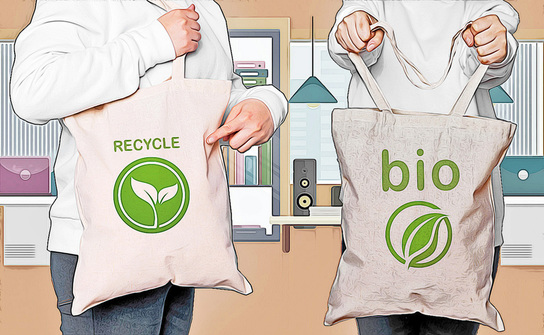At a time when environmental protection is in vogue, it is sometimes difficult to know which actions are truly ecological…
Disposable plastic bags are an ecological disaster, everyone knows that: but what is the best alternative? The personalized jute bag offered by our favorite brand, or the organic cotton one distributed by its competitor?
This is the question we will try to answer today.
What is an ecological fabric?
Despite repeated marketing arguments on all social networks and TV screens by major fashion retailers, there is no material with zero impact on the environment.
Whether it’s natural fabrics from organic farming or recycled materials, all require energy and resources for transformation and production, as well as for transportation.
To limit your environmental impact, it is useful to choose reusable shopping bags with the longest possible lifespan. Whether it’s cotton or jute, your bag will pollute less if you keep it for 3 years rather than discarding it after 3 months.
What is cotton?
Cotton is a natural material derived from the cotton plant, a fragile plant that needs to be cultivated using large quantities of fertilizers, pesticides, and insecticides to achieve good yields.
Additionally, this plant requires a lot of water, and it is estimated that about 10,000 liters of water are needed to produce one kilogram of cotton. Experts even consider its cultivation responsible for the disappearance of the Aral Sea, which was the 4th largest lake in the world just 60 years ago.
If we add the sad history of the cotton plantations in the southern United States, we understand why this material has a bad reputation…
Organic cotton
However, it’s not the cotton itself that is problematic, but the way it has been cultivated. Let us not forget that cotton is natural, durable, and recyclable!
Organic cotton is therefore an interesting alternative, eliminating the use of chemical fertilizers and pesticides. Cultivated in climates favorable to its growth (which requires warmth and a lot of water) like the southern United States, the Indian subcontinent, or sub-Saharan Africa, it has a low environmental impact. This makes it considered eco-responsible.
What is jute?
Jute is a tropical plant known for having one of the longest natural fibers, which can also be easily processed using the biological method (there is also a chemical method, more costly and thus less used) to produce fabric.
Amazingly, its cultivation has a positive impact on the environment due to excellent yield (30 tons per hectare compared to 10 tons per hectare for cotton), meaning there is no need to encroach on natural areas, and its ability to absorb CO2 (15 tons of carbon dioxide absorbed per hectare).
Natural, low resource consumer, biological, recyclable… Is jute the perfect fabric? The situation isn’t that simple.
The limits of jute
While jute is undoubtedly one of the most eco-responsible materials, its use in clothing is difficult. The fiber naturally contains a lot of lignin, making jute resistant but difficult to weave and, let’s face it, not very pleasant to wear…
This is why its main use is in making ropes and strings, but also bags. It is also found in curtains, carpets, coverings… but rarely in clothing.
So, which bag is the most ecological?
You probably already guessed; it’s the jute bag with the logo of your favorite brand that is the most eco-responsible and has the lowest impact on our environment.
Let’s recall the reasons:
• A cultivation that consumes few resources and uses no chemicals.
• A biological treatment to extract the fiber.
• A long lifespan due to its great robustness.
• A material that is both biodegradable and recyclable.
Therefore, there is no doubt that the jute bag should be your preference. However, if you already have an organic cotton bag, there is no need to throw it away: continue using it, and recycle it when it’s at the end of its life. When you replace it, you can opt for a jute shopping bag!
Other ideas for a more ecological approach
As jute is one of the most ecological materials available, it is good to spread its usage as much as possible. Among the eco-responsible uses of jute, we highlight:
• Gardening: jute fabric can protect young trees or maintain soil moisture.
• Home improvement: whether to cover the base of a walkway, protect walls from cracks, or as a decorative element, jute fabric finds many applications in the home.
• Storage: jute bags are useful for shopping, but also for storing dry foods like coffee, peas… In fact, they are often used in agriculture.
While jute is a “miracle solution” to the problem of plastic use, the fashion industry unfortunately cannot benefit from its many advantages…
You hoped to dress eco-responsibly using jute. That will not be possible without making significant sacrifices on your comfort, but you can always turn to organic cotton, linen, hemp, or one of these 11 ecological materials for your clothing.
A final word
It’s the small actions, repeated millions of times, that make significant changes. By using jute bags, you will help limit the proliferation of plastic waste.
Additionally, by preferring jute over organic cotton for your shopping bags, the latter can be used in the clothing industry!
Jute bag and organic cotton T-shirt: this is the winning combination for those who think of the environment.



